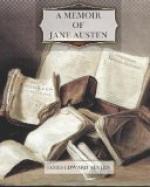work themselves. Well-dressed young men of my
acquaintance, who had their coat from a London tailor,
would always brush their evening suit themselves,
rather than entrust it to the carelessness of a rough
servant, and to the risks of dirt and grease in the
kitchen; for in those days servants’ halls were
not common in the houses of the clergy and the smaller
country gentry. It was quite natural that Catherine
Morland should have contrasted the magnificence of
the offices at Northanger Abbey with the few shapeless
pantries in her father’s parsonage. A young
man who expected to have his things packed or unpacked
for him by a servant, when he travelled, would have
been thought exceptionally fine, or exceptionally
lazy. When my uncle undertook to teach me to
shoot, his first lesson was how to clean my own gun.
It was thought meritorious on the evening of a hunting
day, to turn out after dinner, lanthorn in hand, and
visit the stable, to ascertain that the horse had been
well cared for. This was of the more importance,
because, previous to the introduction of clipping,
about the year 1820, it was a difficult and tedious
work to make a long-coated hunter dry and comfortable,
and was often very imperfectly done. Of course,
such things were not practised by those who had gamekeepers,
and stud-grooms, and plenty of well-trained servants;
but they were practised by many who were unequivocally
gentlemen, and whose grandsons, occupying the same
position in life, may perhaps be astonished at being
told that ‘
such things were.’
I have drawn pictures for which my own experience,
or what I heard from others in my youth, have supplied
the materials. Of course, they cannot be universally
applicable. Such details varied in various circles,
and were changed very gradually; nor can I pretend
to tell how much of what I have said is descriptive
of the family life at Steventon in Jane Austen’s
youth. I am sure that the ladies there had nothing
to do with the mysteries of the stew-pot or the preserving-pan;
but it is probable that their way of life differed
a little from ours, and would have appeared to us
more homely. It may be that useful articles,
which would not now be produced in drawing-rooms,
were hemmed, and marked, and darned in the old-fashioned
parlour. But all this concerned only the outer
life; there was as much cultivation and refinement
of mind as now, with probably more studied courtesy
and ceremony of manner to visitors; whilst certainly
in that family literary pursuits were not neglected.
I remember to have heard of only two little things
different from modern customs. One was, that
on hunting mornings the young men usually took their
hasty breakfast in the kitchen. The early hour
at which hounds then met may account for this; and
probably the custom began, if it did not end, when
they were boys; for they hunted at an early age, in
a scrambling sort of way, upon any pony or donkey
that they could procure, or, in default of such luxuries,




